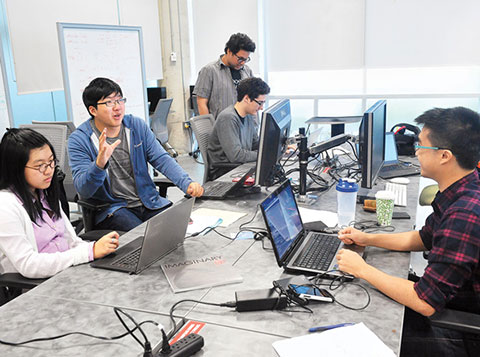The question of how much societies benefit from universities intrigues Shiri Breznitz, a professor at the Munk School of Global Affairs who studies university-led innovation and economic development. This spring, she will be advising on a U of T survey that seeks to measure the university’s impact through its more than 500,000 alumni around the world. She recently spoke about the project, and innovation at universities more broadly, with U of T Magazine editor Scott Anderson.

When you look at a university’s contributions to a region, you distinguish between short term and long term. Why?
The short-term contributions are the actual dollars that flow into a region due to the university’s presence – employee salaries, for example, and purchases such as office space and campus food. Outside funds such as donations, grants and government financial support are also considered in determining a university’s economic impact.
In the long term, we seek to measure the future income of graduates and the employment and revenues of companies spun out of university research. We tend to focus on the commercialization of knowledge because it’s easier to quantify. When a technology developed at U of T is sold or licensed to a company, the university gets royalties. If a spinout company from U of T employs 20 people, we know roughly what this is worth. But even these measures account for only a small proportion of the long-term impact of a university. We also need to measure the value of volunteer work by faculty, students and alumni, the value of free public lectures, which happen almost every day at U of T – and much more. The Alumni Impact Survey I’m working on will address some of these questions and provide a far better picture of how important U of T is to the Toronto region, the province and the country.
Why are alumni responses to the survey so important?
There are two reasons: One, universities receive public funding, so they need to be able to demonstrate the extent of their societal contribution. Second, we want to show our alumni how valuable their U of T degree is. I moved here from the U.S., and I find Canadians are shy about touting their achievements. This survey is about sharing the collective story of U of T alumni and demonstrating how well they’ve done. It’s an important story.
You noted that commercializing knowledge is a long-term contribution from universities that’s often quantified. How effective is U of T at this?
U of T can compete with any of the world’s top research universities on technology transfer and commercialization. What’s unique about U of T is its approach to entrepreneurship. It is clear from studies that you can’t just say, “OK, we’re going to do entrepreneurship now.” You need to make organizational change to allow for it and you need to teach it. U of T is doing both. U of T has entrepreneurship champions who promote it across the university. Students and faculty who want to try out a business idea or learn about entrepreneurship can do so easily and in any field. The university supports entrepreneurship teaching, business acceleration and liaison with industry.
Some think faculty should pursue their research interests completely unencumbered by the concerns of business while others believe they should pursue more research with clear applications. Which camp do you belong to?
I definitely believe in the basic research approach. Most of the disruptive technologies that have come out of universities have come from basic research questions. You need to allow people to explore the unknown. This is how you discover something totally new.






